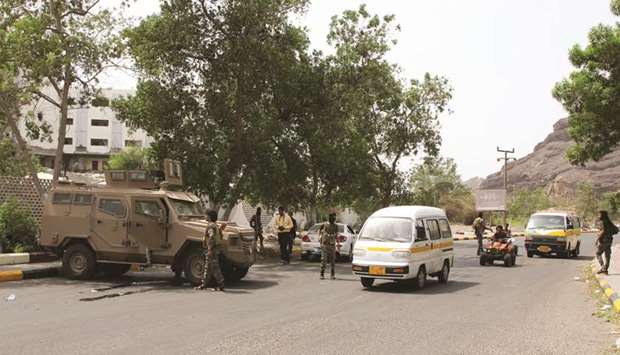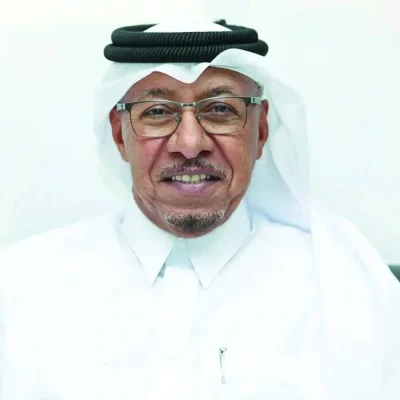The head of Yemen’s separatist movement said he was ready to take part in Saudi-brokered peace talks after clashes with pro-government forces killed dozens in second city Aden.
Abu Dhabi’s powerful crown prince, who met Saudi Arabia’s King Salman yesterday, also backed Riyadh’s call for dialogue.The fighting in Yemen’s southern port city pitted Saudi-backed government forces against the UAE-trained Security Belt Force, both of which have been fighting Houthi rebels who seized the capital Sanaa in 2014.
While the two sides are technically supported by a Saudi and Emirati-dominated military coalition, the Security Belt is largely made up of fighters who oppose President Abd-Rabbu Mansour Hadi and seek an independent south Yemen.
Last week the separatists seized army bases and a presidential palace in temporary capital Aden, prompting the government to accuse the UAE of backing a “coup”. The chief of the separatist Southern Transitional Council (STC), which is backed by the bulk of Security Belt fighters, said late Sunday he was committed to a ceasefire in Aden.Aidarus al-Zubaidi said last week’s violence had been provoked by Hadi’s forces, who planned to assassinate the movement’s leaders then “provoke our people and liquidate our presence”. That left separatist fighters with “only two options: either self-defence, or surrender and accepting the liquidation of our just cause,” Zubaidi said, according to an English translation of his televised speech posted on the STC website.
Yemen’s government has accused the STC and the UAE of staging a “coup” against it.
But Abu Dhabi’s Crown Prince Mohamed bin Zayed al-Nahyan said yesterday that dialogue was “the only way to resolve differences between Yemenis”. In a statement carried by the Emirates’ official WAM news agency, the crown prince during his brief visit backed a Saudi call for an urgent meeting between the warring parties, saying it “embodies the common concern for Yemen’s stability”. Prince Mohamed also urged Yemeni factions to “seize this opportunity, and carry out talks to reach a consensus that is in the best interest of Yemen and its people.”
The International Committee for the Red Cross said yesterday that clinics had reported “scores dead” and hundreds wounded in the fighting, which threatened to open a new front in a conflict that has devastated the country.
“Hospitals struggling without basic equipment. Wounded people dying as checkpoints prevent them reaching clinics,” the ICRC said in a tweet.
Pro-Hadi forces and separatists have theoretically been allies since 2015, fighting the Houthis who control vast swathes of Yemen’s north near the Saudi border — including the capital Sanaa.
But many in southern Yemen seek renewed independence for the region, which was a separate state until 1990.
Zubaidi however voiced support for a ceasefire called by the coalition on Saturday, saying separatists were ready “to work responsibly with...Saudi Arabia in managing this crisis”.
Since the fighting flared on Thursday, around 40 people have been killed and 260 others wounded, including civilians, according to the United Nations. The Yemeni government and separatists on Sunday both voiced backing for Riyadh’s call for dialogue and a truce, and there have been no reports of clashes since. Yemen has already seen years of fighting between the Houthis and coalition-backed forces, which aid agencies say have killed tens of thousands of people.
The war has caused what the UN calls the world’s worst humanitarian crisis, with almost 80% of the population in need of assistance. Early on Sunday, Saudi Arabia conducted an air strike against a separatist position in Aden and warned of further attacks if they fail to withdraw from positions they seized in the city.
Hadi held talks with the Saudi king and Crown Prince Mohamed bin Salman on Sunday to discuss the situation, the state-run SPA news agency reported.
The International Crisis Group think tank has warned that the Aden clashes risk creating a “civil war within a civil war”. The fighting is not the first example of southern separatists opposing forces loyal to Hadi.
In January 2018, clashes between the two sides claimed at least 38 lives. The circumstances around last week’s hostilities remain unclear however.
Separatist commanders accused the Al-Islah party of killing one of its commanders and “infiltrating” the Hadi government, which is politically and financially supported by Saudi Arabia.
The Aden flare-up came weeks after UAE authorities announced their intention to draw down their deployment to Yemen — but stressed they were not quitting the country entirely.

Yemen’s southern separatist troops man checkpoints in Aden, yesterday.


